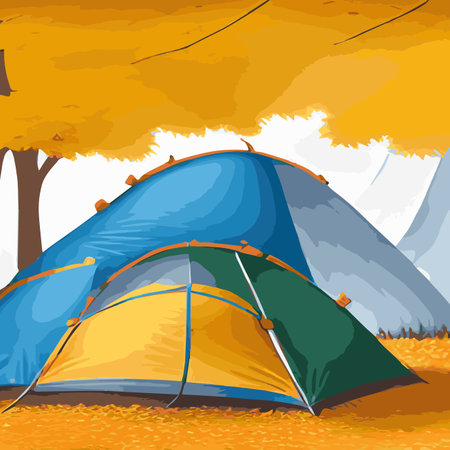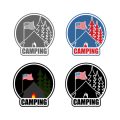Understanding UK Weather: What to Expect on Your Camping Trip
If you’re planning a camping adventure anywhere in the UK, getting to grips with our famously unpredictable weather is your first step. The British Isles are known for their ever-changing skies—one minute it’s bright and sunny, the next you’re caught in a sudden downpour. Rain is practically a given, especially during spring and autumn, but even summer can surprise you with heavy showers or a chilly breeze. Strong winds are common on exposed campsites, particularly in coastal areas or up in the hills, so it pays to be prepared for gusty conditions. Temperatures tend to be on the cooler side, often dipping below what you might expect, especially at night or in more remote regions like Scotland or Wales. All these factors make it essential to choose tents and camping gear that are robust, waterproof, and designed to keep you warm and dry. Understanding how British weather can impact your comfort and safety will help you pick kit that stands up to whatever the great outdoors throws at you—because there’s nothing worse than being caught out by the elements when you’re miles from home.
2. Selecting the Perfect Tent: Key Features for Britain’s Climate
When it comes to camping in the UK, choosing a tent that can withstand the famously unpredictable weather is absolutely crucial. Whether you’re heading to the Lake District or pitching up on the Cornish coast, your shelter needs to be up to the task. Let’s break down the must-have features you should look out for when selecting a tent suitable for British conditions.
Waterproof Ratings: Keeping Dry in the Drizzle
The first thing most UK campers check is the tent’s waterproof rating, often measured in Hydrostatic Head (HH). The higher the HH number, the better your tent will handle persistent rain – something you’ll likely encounter even in summer. Here’s a handy guide:
| Hydrostatic Head (HH) | Suitability |
|---|---|
| 1,500mm – 2,000mm | Light showers; fair-weather camping |
| 3,000mm – 5,000mm | Heavy rain; suitable for most UK conditions |
| 5,000mm+ | Extreme weather; great for year-round or wild camping |
Ventilation: Beating Condensation
With damp mornings and cool evenings, condensation is a common issue inside tents pitched in Britain. Look for features like mesh panels, adjustable vents, and double-skin designs. A well-ventilated tent will help prevent waking up to soggy gear and clammy sleeping bags.
Sturdiness: Standing Up to Gusty Winds
British campsites are no strangers to sudden gusts or coastal breezes. To ensure your tent stays upright, opt for models with robust poles (aluminium often fares better than fibreglass), low-profile shapes (like geodesic or tunnel tents), and plenty of pegging points. Reinforced guy lines are another bonus if you want peace of mind during blustery nights.
Quick Reference: Essential Tent Features for UK Camping
| Feature | Why It Matters |
|---|---|
| High HH Rating | Keeps you dry in persistent rain |
| Effective Ventilation | Reduces condensation build-up |
| Sturdy Construction | Withstands strong winds and changeable weather |
The Practical Takeaway
If you’re investing in a new tent for UK adventures, don’t just go by looks or brand names. Focus on these key features so that, whatever the British weather throws at you—be it drizzle, downpour, or gale—you’re ready to enjoy your trip in comfort.

3. Essential Camping Gear for the British Countryside
When it comes to camping in the UK, unpredictable weather and varied terrain mean you’ll need more than just a basic kit. Here’s a rundown of must-have gear that will keep you comfortable and safe during your countryside adventure.
Sleeping Bags Suited for British Nights
The UK climate can be chilly even in summer, especially in the Lake District or Scottish Highlands. Opt for sleeping bags rated for lower temperatures—ideally down to at least 0°C. Consider a mummy-style bag with a hood, which traps warmth better on those brisk evenings when the temperature drops unexpectedly.
Sturdy Ground Mats and Sleeping Pads
A good night’s sleep starts with proper insulation from the cold, often damp ground. Invest in a quality foam or inflatable ground mat; self-inflating mats are popular among British campers for their comfort and convenience. These not only cushion you from lumps and bumps but also provide crucial warmth by keeping you off the cold earth.
Reliable Cookware for Outdoor Cooking
No British camping trip is complete without a brew and a hearty meal after a long walk. Lightweight but durable cookware, such as stainless steel or hard-anodised aluminium pots and pans, is essential. Don’t forget a portable gas stove—the type that can handle gusty winds common on UK campsites. A whistling kettle is also a classic addition for making tea or coffee first thing in the morning.
Extra Must-Have Items
- Waterproof dry bags: Ideal for keeping clothes and electronics dry during sudden rain showers.
- Head torch or lantern: Essential when daylight fades early, especially in autumn and winter months.
- Multi-tool or penknife: Handy for everything from food prep to emergency repairs.
Practical Packing Tip
Pack smart by storing essentials in easy-to-reach spots in your rucksack—this makes setting up camp quicker if the heavens open or winds pick up unexpectedly. With these key pieces of gear tailored to the quirks of UK camping, you’ll be well-prepared for whatever the great British outdoors throws your way.
4. Packing Tips for UK Campsites: Practicality Meets Comfort
The British outdoors is notorious for its unpredictable weather—sunshine can turn to rain in minutes, and temperatures often drop swiftly, even in summer. To enjoy your camping trip without being caught out, packing smartly is essential. Here’s how you can balance practicality with comfort when gearing up for a UK camping adventure.
Layering Clothing: Adapt to Any Forecast
One of the golden rules for camping in the UK is to dress in layers. This allows you to add or remove clothing as the weather changes throughout the day. Start with a moisture-wicking base layer, add an insulating mid-layer (like fleece), and top it off with a waterproof jacket. Don’t forget warm socks, hats, and gloves—even midsummer evenings can get chilly.
| Layer Type | Recommended Material | Purpose |
|---|---|---|
| Base Layer | Merino Wool/Synthetic | Wicks sweat away, keeps you dry |
| Mid Layer | Fleece/Down | Provides insulation and warmth |
| Outer Layer | Waterproof/Breathable Shell | Protects against rain and wind |
Waterproof Kits: Be Ready for Rain
No matter what the forecast says, always pack comprehensive waterproof gear. That includes not just your outer jacket but also waterproof trousers, gaiters, and dry bags to protect electronics and spare clothes. A lightweight poncho can be a lifesaver during sudden downpours.
Pack Organisation: Quick Access When It Matters Most
An organised rucksack makes life much easier at camp. Use packing cubes or stuff sacks to separate wet from dry items, keep food apart from clothing, and ensure essentials like torches and first aid kits are easy to grab. Consider using colour-coded bags for quick identification.
| Packing Item | Purpose |
|---|---|
| Packing Cubes/Stuff Sacks | Organise clothes by type or weather condition |
| Dry Bags | Protect electronics and valuables from rain |
| Ziploc Bags | Store snacks or small essentials within reach |
A Few Extra Essentials for UK Campsites:
- Quick-dry towels: Ideal for soggy mornings or after unexpected showers.
- Midges repellent: Especially important in Scotland or near lakes and rivers.
- Campsite slippers: Give your boots a break while keeping feet dry inside your tent.
- Spares of pegs and guy lines: UK winds can be fierce—prepare accordingly.
Packing efficiently for UK campsites means thinking ahead about comfort without sacrificing practicality. With these tips, you’ll be ready to face Britain’s ever-changing outdoors with confidence—and maybe even enjoy a few surprises along the way!
5. Real-Life Testing: My Experience With UK-Focused Camping Kit
If you’ve ever camped in the unpredictable British weather, you’ll know that textbook recommendations only get you so far. Over the past few years, I’ve put a variety of tents and camping gear through their paces from the wilds of the Lake District to the blustery coasts of Cornwall. Here are my honest thoughts and practical suggestions for anyone planning to tackle the UK’s unique conditions.
Pitching Up in Wind and Rain
My first lesson came on a sodden weekend in Snowdonia. The budget pop-up tent I’d optimistically brought along struggled against 40mph gusts, and by dawn, I woke to puddles inside—proof that not all “waterproof” labels are created equal. Since then, I always look for hydrostatic head ratings above 3000mm and sturdy aluminium poles when shopping for tents intended for UK trips.
Condensation and Ventilation Challenges
With our damp climate, condensation is a constant companion. During a chilly Scottish spring, I learned to appreciate well-designed ventilation panels and double-walled tents. Single-skin options might seem lightweight but often left my sleeping bag clammy by morning. For British conditions, I’d steer clear of single-layer tents unless you’re an experienced minimalist with robust kit.
Keeping Warm – The Right Sleeping Bag Matters
Another revelation came after a shivering night in Derbyshire; my summer-weight sleeping bag simply wasn’t up to scratch. Now, I opt for a three-season bag rated for at least -5°C, even in late spring or early autumn. Paired with an insulated sleeping mat, this combo has kept me comfortable no matter what British weather throws at me.
Practical Gear Recommendations
For cookware, nothing beats a reliable gas stove—it’s quick to light even in drizzle. And don’t forget a decent headtorch (the countryside gets pitch black!) plus waterproof dry bags for keeping your essentials safe. Invest in quality over gimmicks; my battered but trusty rucksack has outlasted trendier alternatives every time.
In summary, real-world testing across the UK has taught me to prioritise waterproofing, sturdy build quality, and proper insulation above all else. It’s tempting to cut corners or chase ultra-lightweight kit, but comfort—and staying dry—always wins when camping on home turf.
6. Where to Find Quality Gear in the UK: Shops and Online Favourites
When it comes to gearing up for a proper British camping adventure, having reliable kit is half the battle won. Luckily, the UK boasts a solid mix of well-established outdoor retailers and handy online resources that make finding quality tents and gear straightforward—even if you’re prepping last-minute or searching for something specialist.
Trusted High Street and Specialist Outdoor Shops
- Go Outdoors: With superstores across the country, Go Outdoors is a staple for everything from family tents to technical hiking kit. Their staff are usually outdoorsy types themselves, so don’t hesitate to ask for advice on kit suited to unpredictable British weather.
- Cotswold Outdoor: Known for top-notch customer service and an excellent range of premium brands, Cotswold Outdoor’s stores are dotted around the UK. They often have in-store experts to help with fitting boots or choosing the right sleeping bag for a chilly Lake District night.
- Millets: A classic choice for affordable basics and starter gear—great if you’re new to camping or kitting out the kids without breaking the bank.
Online Retailers for Convenience and Choice
- Alpkit: A brilliant UK-based brand with their own range of tents, sleeping bags, cookware, and more. They focus on quality without the hefty price tag and offer honest reviews from real users.
- Trekitt: Based in Hereford but shipping nationwide, Trekitt stocks reliable gear from leading brands, with friendly advice just a phone call away if you’re unsure about what suits your trip.
- Amazon UK: While not always specialist, Amazon’s vast selection and speedy delivery can be a lifesaver if you need something at short notice—just check reviews carefully before buying unknown brands.
Useful Online Resources and Communities
- The Bushcraft Forum: A helpful place to swap tips with seasoned campers about gear that stands up to British woodland and weather.
- UKCampsite.co.uk: Not just campsite listings—this site’s forums are goldmines for honest kit reviews and recommendations based on UK conditions.
Pro Tip
If possible, visit a physical shop to try out tents or sleeping mats before buying—UK return policies are generally fair, but nothing beats getting hands-on with your future shelter before heading into the wild. Whether shopping on the high street or online, sticking with reputable UK-based retailers ensures your gear will be fit for local climates—and you’ll have support close to home if anything goes awry.


